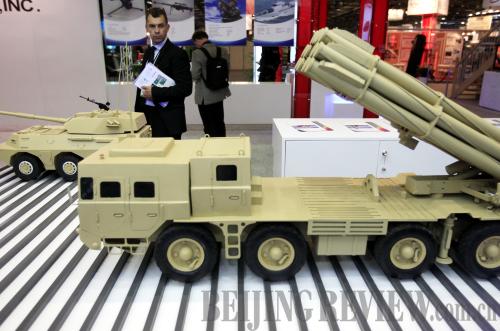|
 |
|
CHINA'S DEBUT: A visitor checks out an armored vehicle model of the China North Industries Corp. at the Eurosatory 2010 defense armament exhibition in Paris on June 17. It was the first time Chinese companies attended the biennial exhibition (ZHANG YUWEI) | As a large developing country, China adopts an open attitude toward bringing in the EU's advanced technologies in environmental protection and new energy. If the EU attaches unreasonable conditions to technology transfers, on the grounds of intellectual property rights protection, it will only harm China-EU cooperation.
As one of the world's most important economies, the EU is embracing deepening integration, increasingly well-tuned coordination in foreign trade policies and a stronger wish to develop relations with China. All these have made it possible for the EU to keep its markets open, while ensuring continued progress in the China-EU strategic partnership.
The position of the EU high representative for foreign affairs and security policy, which Ashton has recently claimed, and the new EU foreign affairs agency, the European External Action Service, which she leads, were both established based on the Lisbon Treaty, which came into effect on December 1, 2009. They were both established to coordinate EU members' foreign policies. Re-evaluating the EU's China policy is an inevitable part of their job.
In retrospect, many measures China took to cope with the financial crisis demonstrated its determination to get through the hard times together with the EU. For instance, China proposed to launch the China-EU High-Level Economic and Trade Dialogue, which was held in Beijing in 2008 and in Brussels in 2009. It also had frank discussions with the EU on the exchange rate of the yuan against the euro.
It considered buying euro-denominated bonds to solve the liquidity problems in Europe and help stabilize the euro. It was engaged in extensive cooperation with a series of multilateral frameworks including the Group of 20.
China hopes Ashton gained a more comprehensive picture of the country through her visit to less developed areas in its hinterland. Hopefully, this visit will help the EU gain a better understanding of China and establish a sound foundation for the China-EU strategic dialogue.
Disparities in EU member states' economic development have increased since the global financial crisis abated. As a result, intergovernmentalism has gained currency in EU governance. What's more, the new foreign affairs agency established under the Lisbon Treaty still needs time to operate smoothly. This may affect the efficiency of the EU's external policymaking and pose a challenge to the efforts of China and the EU to seek new strategic agreements and new economic and trade cooperation.
The author is an associate research fellow with the China Institute of International Studies
| 